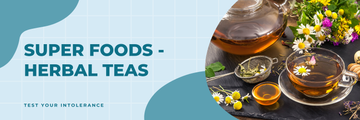Sip into Wellness: The Power and Pleasure of Herbal Tea
Whether you start your day with a revitalising cup or wind down in the evening with something soothing, herbal tea is a gentle and flavourful way to enhance your health and well-being. Revered for centuries, herbal tea offers both medicinal benefits and sensory delight, making it one of the most enduring and versatile beverages in the world.
A Rich and Ancient Tradition
The history of herbal tea stretches back thousands of years. Records from Ancient Egypt and Ancient China document its use not only for enjoyment but also for treating ailments and promoting wellness. These early civilisations understood what many of us continue to discover today: herbal tea can support both body and mind.
Naturally Caffeine-Free Goodness
Unlike black tea or coffee, most herbal teas are naturally caffeine-free, making them a popular choice for people seeking alternatives that won’t interfere with sleep or elevate stress. They’re ideal for those looking to reduce caffeine consumption while still enjoying a warm, comforting beverage at any time of day.
Why So Many Love Herbal Tea
Visit any supermarket and you'll be amazed by the vast selection of herbal tea blends, brands, and flavours. Tea lovers are drawn to these brews for a range of reasons:
-
Aromatics and Flavour: The diverse ingredients, from flowers to spices, offer a sensory experience that’s hard to match.
-
Health and Wellness: Many choose herbal tea as a natural remedy, thanks to its purported benefits.
-
Functional Effects: Some herbal teas are chosen for specific purposes, relaxation, digestion, detoxification, or even slimming.
Preparation: Simple and Effective
Making herbal tea is as easy as it is rewarding. Most are prepared by steeping fresh or dried plant parts, including flowers, leaves, seeds, or roots, in boiling water for several minutes. Roots and seeds may require boiling on the stove to fully release their properties. Once steeped, the tea is strained and enjoyed either hot or cold.
If you’re considering using herbal tea for medicinal purposes, it’s important to:
-
Research the herbs thoroughly
-
Be aware of interactions with any medications or supplements you’re taking
-
Consult a healthcare professional for guidance
While generally safe, herbal remedies can have potent effects and should be consumed responsibly.
Popular Herbal Teas and Their Benefits
Here are some widely available and lesser-known herbal teas you might want to explore:
-
Chamomile: Promotes relaxation and supports restful sleep
-
Fennel: Helps relieve cold symptoms and is a natural diuretic
-
Green Tea: Rich in EGCG, known for supporting heart health and lowering cholesterol (note: contains some caffeine)
-
Lemon Balm: Aids digestion and has antiviral properties
-
Nettle: Supports respiratory health and boosts blood cell production
-
Peppermint: Soothes the digestive tract and has antimicrobial properties
-
Thyme: Eases bloating and supports digestive function
Herbal Tea as Part of a Healthy Lifestyle
Drinking herbal tea can be more than just a relaxing ritual, it can become a valuable part of your daily wellness routine. Whether you’re looking for better sleep, improved digestion, or a natural way to unwind, there’s likely a herbal tea to suit your needs.
Pair your favourite brew with nourishing meals, like quinoa bowls or fresh vegetable soups, for an extra dose of wellness. The synergy of clean eating and herbal tea can have lasting effects on your energy levels, mood, and overall vitality.
So next time you’re seeking comfort in a cup, reach for herbal tea, and sip your way to better health, one calming infusion at a time.










